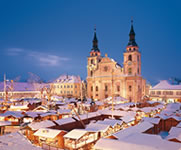Other highlights
Contact
Bautzner Strasse 45-47
01099 Dresden
Email:
[email protected]
Internet:
www.sachsen-tour.de
Cities

The capital of the Free State of Saxony is Dresden. With Renaissance, baroque and 19th century architecture, the splendid cupola of the Church of Our Lady and the sweeping Elbe panorama, Dresden has often been referred to as the "Florence on the Elbe". The blend of attractive architecture, internationally famous museum collections and lively traditions in music and the fine arts is what shapes Dresden's cultural life today. Added to this is the scenic beauty along the River Elbe, with the magnificent palaces and villas.
Today, the confident merchant town of Leipzig is livelier than ever - a buzzing destination for trade fairs, conferences and trade, it is also a centre for culture, nightlife and shopping. Its remarkable Renaissance and baroque buildings, historical commercial buildings and arcades stand resplendent once again and provide the ideal setting for sightseeing or shopping. Leipzig also offers a wealth of art and culture at venues such as the Gewandhaus concert hall and the opera house, with the St. Thomas's choir as well as numerous cabaret shows, theatres and jazz bars. Leipzig's music tradition is founded on such names as Bach, Mendelssohn and Schumann.
Chemnitz is Saxony's third city, and boasts impressive art treasures, a variety of culture, magnificent Art Nouveau architecture, nostalgic industrial culture and idyllic scenery. The opera house has earned Chemnitz its reputation as the "Saxon Bayreuth" with its successful Wagner performances, while the art collections with their acclaimed special exhibitions always cause a stir. The 200 years of Saxon industrial history can be traced in the Industrial Museum.
Bautzen, or Budyšin, has been the capital of the Sorbs since 1002. Now a Slavic minority in Lusatia, Budyšin remains their cultural and political centre. The town's famous landmark is the "Alte Wasserkunst" water tower. Visitors should also be sure not to miss the medieval fortifications, the historical town centre and the impressive Ortenburg Castle. 17 towers and bastions enjoy a commanding view over the town. The best known of these is the Reichenturm observation tower, also known as the "crooked tower". The traditional bars and rustic inns in little back streets are always very inviting.
At the very heart of Europe is the town of Görlitz. Impressive late-Gothic, Renaissance, baroque, 1870s and art nouveau architecture shapes the townscape and bears witness to the rich history of the former cloth-making and trading town. With more than 4,000 listed buildings, the "pearl of Upper Lusatia" has a medieval core ringed by very beautiful residential areas which date back to the 1870s and are still largely intact.
The composer Robert Schumann and August Horch, a pioneer in automotive engineering, are among the most famous citizens of Zwickau. Music lovers can find out all about the life and works of Robert Schumann in the house where he was born. Motoring enthusiasts should head for the August Horch Museum, where they can learn all about how the car has conquered the world. Zwickau's lovingly restored town centre has many fine places of interest to visit, dating back through various centuries.
Travel Planner
Select an option...
Map of Germany
Highlights in brief
- Dresden
State capital, opera house, Zwinger Palace, "Blaues Wunder" suspension bridge, Church of Our Lady - Leipzig
International trade fair venue, Gewandhaus concert hall - Chemnitz
Opera house, Villa Esche - Bautzen
Historical old quarter - Meissen
Porcelain - Netzschkau
Göltzschtal bridge - Olbernhau
Saigerhütte silver mining museum - Radebeul
Home of the writer Karl May - Seiffen
Toy museum - Zwickau
Automotive museum



